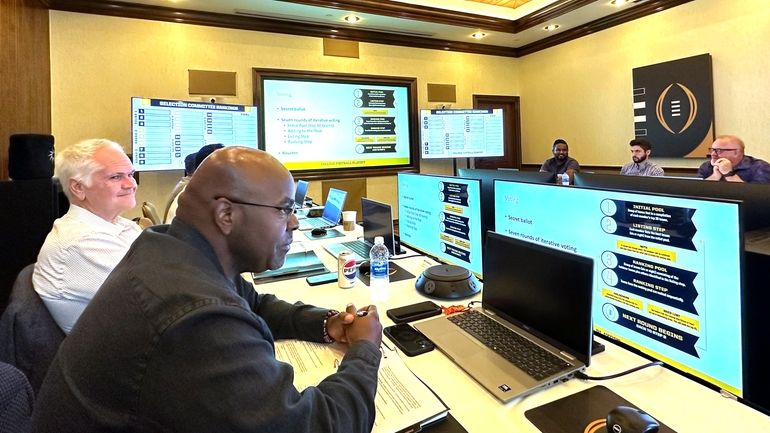The Friday after Thanksgiving proved to be a monumental day in college football, headlined by an extraordinary showdown between the Georgia Bulldogs and the Georgia Tech Yellow Jackets. In what can only be described as a historic clash, the two teams battled through eight grueling overtimes before Georgia emerged victorious with a dramatic 44-42 comeback win. The game wasn’t just a spectacle of endurance and determination; it also reignited a fiery debate over the controversial overtime rules in college football.
A Clash for the Ages
The Georgia-Georgia Tech matchup wasn’t just about two teams vying for bragging rights. It was a contest that tested the limits of players, coaches, and fans alike. The Bulldogs, renowned for their dominance in recent years, faced a stiff challenge from a resilient Georgia Tech squad that refused to back down. As the game extended well into the night, the tension was palpable, with every play scrutinized and every decision carrying immense weight.
While Georgia’s victory kept their season alive and added another chapter to their storied rivalry, the extended nature of the game raised questions about its potential repercussions. The physical and mental toll on the players, combined with the sheer length of the contest, left many wondering if the outcome could negatively impact Georgia’s College Football Playoff (CFB) aspirations.
Unpacking College Football’s Overtime Rules
The game also brought renewed focus to the mechanics of college football’s overtime system, which has undergone significant changes in recent years. The current format, introduced in 2021, is designed to reduce player fatigue and prevent excessively long games. However, critics argue that these changes have introduced new problems.
Here’s how the system works: In the first overtime, each team gets one possession to score, with the option to kick an extra point or attempt a two-point conversion following a touchdown. In the second overtime, teams are required to go for a two-point conversion if they score a touchdown. Starting with the third overtime, traditional possessions are abandoned, and the game is decided through alternating two-point conversion attempts until a winner emerges.
This streamlined approach was implemented after the infamous seven-overtime thriller between Texas A&M and LSU in 2018, which raised concerns about player safety and game duration. However, the system has been widely criticized for reducing football’s complexity to a series of isolated, high-pressure plays, which many believe do not adequately reflect the flow and strategy of the game.
Voices of Dissent
The Georgia-Georgia Tech marathon provided ample fodder for critics of the overtime system, with prominent voices in the sports world taking to social media to air their grievances. Josh Pate of CBS Sports didn’t mince words, comparing the current rules to those of a “7-on-7 tournament” and humorously suggesting that he would abolish them on his first day in charge.
Warren Sharp of The Ringer offered practical suggestions to improve the system. He proposed eliminating the requirement for teams to walk up and down the field to change sides between overtimes and doing away with the practice of granting new timeouts before each two-point attempt. These changes, he argued, would make the process smoother and more reflective of the game’s competitive nature.
Chris Vannini of The Athletic lamented the origins of the current rules, pointing out that the entire system was overhauled due to one outlier game. He, like many others, questioned whether the changes truly serve the sport’s best interests. Ryan Brauninger, a writer covering college football and baseball, went even further, calling the system a “lottery” and insisting that a complete overhaul is necessary during the offseason.
The Need for Reform
The uproar following the Georgia-Georgia Tech game has highlighted a growing dissatisfaction with the overtime rules. While the NCAA initially implemented these changes to address concerns about player safety and game length, it’s clear that the current format has not been universally embraced. Critics argue that the system undermines the integrity of the game by turning overtime into a gimmick rather than a continuation of the football battle.
One of the main points of contention is the abrupt shift to two-point conversion attempts starting in the third overtime. This rule, while designed to expedite the conclusion of games, has been criticized for stripping away much of the strategy and nuance that define football. Instead of extended drives and tactical play-calling, overtime becomes a series of high-pressure, make-or-break moments that some feel are disconnected from the rest of the game.
Looking Ahead
The controversy surrounding this game could serve as a catalyst for change. With the offseason on the horizon, the NCAA may face increasing pressure to revisit its overtime rules. Potential solutions could include reverting to the previous system, adopting a hybrid approach, or making incremental adjustments to the existing format.
One idea gaining traction is to allow teams to maintain traditional possessions throughout overtime, with slight modifications to reduce game length. Another proposal involves limiting the number of overtime periods before declaring a tie, though this would likely face resistance in a sport where decisive outcomes are cherished.
Regardless of the approach, one thing is certain: the Georgia-Georgia Tech showdown has reignited a critical conversation about the future of college football. As fans, players, and analysts debate the best path forward, the NCAA will need to carefully weigh its options to ensure that the sport remains both competitive and fair.
For now, the Bulldogs can celebrate their hard-fought victory, but the game will likely be remembered as much for the controversy it sparked as for the drama it delivered. The spotlight is now on college football’s decision-makers to address these concerns and ensure that the sport evolves in a way that honors its traditions while addressing modern challenges.
